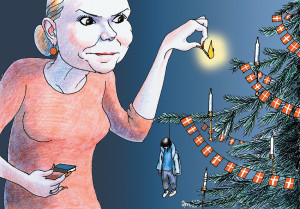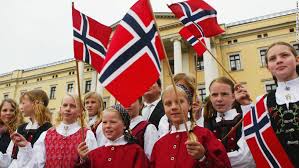
A cartoon published by the Danish newspaper Politiken showing Inger Støjberg, the country’s integration minister, lighting candles on a Christmas tree that has a dead asylum-seeker as an ornament, December 2015
Socialism, in its Scandinavian form, is not friendly to foreigners. Hugh Eakin discovered this and writes about it in “Liberal, Harsh Denmark” (New York Review of Books, March 10, 2016).
Denmark is the very model of the modern Social Democratic state:
known for its nearly carbon-neutral cities, its free health care and university education for all, its bus drivers who are paid like accountants, its robust defense of gay rights and social freedoms, and its vigorous culture of social and political debate, the country has long been envied as a social-democratic success.
But the Danes do not like immigrants:
Denmark has long led the continent in its shift to the right—and in its growing domestic consensus that large-scale Muslim immigration is incompatible with European social democracy.
The attitude against immigrants has grown harsher by the month:
In early September, Denmark began taking out newspaper ads in Lebanon and Jordan warning would-be asylum-seekers not to come. And by November, the Danish government announced that it could no longer accept the modest share of one thousand refugees assigned to Denmark under an EU redistribution agreement, because Italy and Greece had lost control of their borders.
The new law, which passed with support from the Social Democrats as well as the Danish People’s Party, permits police to strip-search asylum-seekers and confiscate their cash and most valuables above 10,000 Danish kroner ($1,460) to pay for their accommodation; delays the opportunity to apply for family reunification by up to three years; forbids asylum-seekers from residing outside refugee centers, some of which are tent encampments; reduces the cash benefits they can receive; and makes it significantly harder to qualify for permanent residence. One aim, a Liberal MP explained to me, is simply to “make Denmark less attractive to foreigners.
Why is enlightened, socialist Denmark so hostile to foreigners?
the Danish welfare system [has] an unusually important part in shaping national identity. Visitors to Denmark will find the Danish flag on everything from public buses to butter wrappers; many of the country’s defining institutions, from its universal secondary education (Folkehøjskoler—the People’s High Schools) to the parliament (Folketinget—the People’s House) to the Danish national church (Folkekirken—the People’s Church) to the concept of democracy itself (Folkestyret—the Rule of the People) have been built to reinforce a strong sense of folke, the Danish people.
Ethnically and religiously homogenous Scandinavia has been able to construct a welfare state because everyone looks like and largely acts like everyone else. The countries feel like a big family, and as in families, people are willing to support, however grudgingly, the ne-er-do-well brother-in-law.
But Moslems are foreigners, and their customs and actions make it impossible for the Danes to regard them as fellow-Danes. Nor do the Moslems seem to want to assimilate; they want welfare, but they don’t want to become Danes, whose culture they dislike, despise, sometimes murderously hate.
Socialism has never caught on in the United States because of the ethnic and religious heterogeneity of the country. Bernie Sander’s was elected in 96% white Vermont, and has done well in states with mostly white voters and poorly in states with large minority populations. Not even African-Americans like Socialism; they want programs targeted at them not at everyone in general.
The liberal academic Robert Putnam investigated the effects of diversity at the neighborhood level and as not happy with what he found:
It HAS BECOME increasingly popular to speak of racial and ethnic diversity as a civic strength. From multicultural festivals to pronouncements from political leaders, the message is the same: our differences make us stronger.
But a massive new study, based on detailed interviews of nearly 30,000 people across America, has concluded just the opposite. Harvard political scientist Robert Putnam — famous for “Bowling Alone,” his 2000 book on declining civic engagement — has found that the greater the diversity in a community, the fewer people vote and the less they volunteer, the less they give to charity and work on community projects. In the most diverse communities, neighbors trust one another about half as much as they do in the most homogenous settings. The study, the largest ever on civic engagement in America, found that virtually all measures of civic health are lower in more diverse settings.
The more similar people are, the more they trust one another. This is true at both the neighborhood and national level. At the national level, such trust enables a society to develop a strong social democracy. People know how other people think and act, and trust the government to spend a huge share of national income effectively. But diverse societies have less trust; in some societies trust does not extend beyond the family or tribe, and the state is too weak to function at all (e.g. Iraq).
So the best foundation for a social democratic state is homogeneity. The more diverse the society, the harder it is to implement social democratic programs, because each group suspects that the other group is benefiting more.
Denmark is still the happiest country in the world, along with the other Scandinavian countries, the Netherlands, New Zealand, Australia, Canada, all “fairly homogeneous nations with strong social safety nets.” The homogeneity, social democracy, and happiness are all closely connected.
